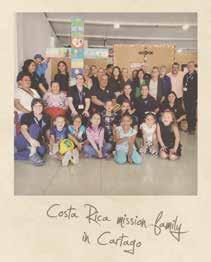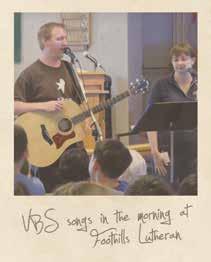
7 minute read
A Time for Renewal
by Terry Defoe & Brian Wonnick
A perfect storm. 2020 had it all—a pandemic, economic upheaval, and unprecedented political polarization—all merged into one. The church did not escape. Worship services were canceled or curtailed. Our ability to distribute the Sacrament was severely hampered.
Through it all, however, God’s people persisted, continuing to preach and teach and administer the Sacraments. And now, well into 2021, when we look back we realize that we’ve learned a lot. We recognize anew the value of prayer. We affirm the privilege of worshiping together and look forward to that time when corporate worship is the norm once again. It seems that we are now seeing the first glimmers of hope. God’s church wants to be prepared as the pandemic moves into its next stages. Many congregations are focused on establishing revised guidelines for the road ahead.
The church does not have the luxury of carrying out the Great Commission in exactly the same way as previous generations did. The Gospel does not change and neither do the Sacraments, but society around us certainly does. We need to regularly adapt our methodologies for preaching the unchanging Gospel to a changing world. We seek renewal that reaffirms our Scriptural heritage and actively engages the world as it is, not as we would like it to be.
Given that reality, what insights can we glean from God’s Word as we move into an uncertain future? A basic principle underlying renewal is laid out for us in God’s Word. Paul’s New Testament letters reveal a strategy that may be used to great benefit.
Consider Paul’s letters to the churches in Thessalonica and Corinth. Thessalonica was facing challenges, but the Apostle Paul puts a positive frame on the picture. He begins his letters with an emphasis on thanksgiving. He acknowledges their faith, their labor of love, and their steadfastness in hope. Only then does he mention the problems they faced.
The church at Thessalonica was tempted to give in to fear, but Paul wanted these believers to be positive and thankful as they move forward into a challenging time. He stresses that what was most needed in the current situation was already present among God’s people. So he first summarizes their strengths before presenting the challenges. Only in this context would his pastoral concerns be properly received.


Even a cursory reading of Paul’s first epistle to the Corinthians reveals that the church in Corinth was dysfunctional. But just like with the Thessalonians, Paul begins his letter to the Corinthian congregation with a gracious and optimistic greeting and prayer. He reminds the Corinthians that they belong to God. They are God’s own people. They are sanctified, called to be saints. Paul emphasizes the grace of God apparent in their speech, their knowledge, their testimony of Christ, and their possession of spiritual gifts. Again, his positive words set the tone for everything that follows.
Fast forward to our day. As our congregations make plans for an altered reality, it is clear that God wants to restore our sense of hope. As we update our plans, we do well to reflect on the blessings we have experienced in the past—the times we have spent studying His Word together; worship services that have encouraged us and strengthened our faith; and fellowship events that were a great blessing. God has blessed us as we shared His Word, administered the Sacraments, and nurtured the faith of His people.
These positive memories, however, often fade in the busyness of day-to-day life. As part of their planning, many congregations find it helpful to interview their members, encouraging them to recount stories of their personal faith journey. Every member has a story to tell, a blessing to recount, a friendship established, a life changed by the grace of God in Christ. These positive accounts, humbly told, bring glory to God and remind the church of the great things He has done among us.
Preparation for a new reality involves a look in the rearview mirror before we turn our attention to the road ahead. We can and we should build our future on the best of the past. We can ask our members what their Saviour means to them—not just on Sundays but every day of the week. When congregational leaders listen to these stories, they can identify common themes, and with permission, share those themes with the congregation at large. This process works best when everyone has an opportunity to participate. Every individual has something important to add to the congregational tapestry. The church truly is a body with many members, each with a part to play in the optimal functioning of the whole.
Storytelling links the mind and the heart, our rational self with our emotions. When another individual shares their faith story, our own experience is revisited as well. Long lost details related to our faith are re-lived vicariously. Storytelling disarms us; our mental defenses are lowered and we just listen. And when these accounts focus on blessings, we are reminded of the resources we possess both as individuals and as a congregation.
We face challenges—this is most certainly true—but we have more resources available to deal with these challenges than we often give ourselves credit for. Reflecting on our own congregation’s stories can help us to see ourselves and our abilities in a new light. We can more easily identify possibilities. As an old friend once said, “I don’t have any problems. I just have a lot of opportunities!”
Positive storytelling can be a powerful catalyst for changing our attitude. Negativism, by contrast, saps our strength and plays havoc with our motivation. Attention too often turns inward, encouraging the group to look for someone or something to blame. But we need not remain in such negativity. Consider the following words from the Stewardship Department of the Texas District of The Lutheran Church— Missouri Synod:
"What if we stopped this negative obsession and started paying attention to what and whom we appreciate, right now? Our experience is a function of what we focus on. Each and every moment we have a choice—where will we place our attention? It’s important that we are able to confront, face, and deal with ship by the compass of God’s Word. There is no reason why we cannot enter the future focused on our strengths rather than weaknesses, on hope rather than despair, on unity rather than conflict.


These ideas may seem a little abstract. That’s because the story has not been fully told. Our goal has been to describe a foundation for congregations as they plan their future together. But that’s not where the process ends: the next step is to build a structure on that foundation, to add the “how” to the “what” and the “why.” We seek God’s will in these matters, expressed in His Word and implemented difficulties. However, we don’t have to obsess about the bad stuff and let it ruin us. Each of us can consciously choose to focus on the good stuff in our lives, with others, and most importantly, towards ourselves. There are great things happening in your life and around you all the time—if you choose to look for them. Our words have the power to create, not just describe. Focus on what you appreciate about the people around you and let them know that.”
Our primary motivation for serving the Lord is Christ’s sacrifice of body and blood on the cross for the forgiveness of our sins and the promise of eternal life. By our gracious Lord’s enabling, we can move beyond a “fixing problems” mentality to a rediscovery of our strengths in Christ—strengths we can then apply as specific plans are fleshed out and we explore together God’s plan for His people. Positive, shared values provide God-pleasing motivation as we steer the congregational through the various spiritual gifts and natural abilities He has graciously given us.
We have stressed the importance of moving away from a planning paradigm based on “fixing” problems to one based on drawing upon the resources already present in our congregations. We praise God for making all things new, for making us His new creation, for putting a new song on our lips, and for putting new wine in old wineskins.
Change is not always God’s will—for example, when it comes to change in doctrine or confessional standards. But in other instances, change can be both good and right. As our congregations move forward with the Great Commission in a new world, may the Spirit of our Lord encourage us to use the gifts He has given us in new ways—with thanksgiving for the blessings of the past and hope for the future.
Rev. Terry Defoe, pastor emeritus, is a member of New Beginnings Lutheran Church (Regina). Brian Wonnick is a former Development Officer with Lutheran Foundation Canada, and a member of Good Shepherd Lutheran Church (Regina).






